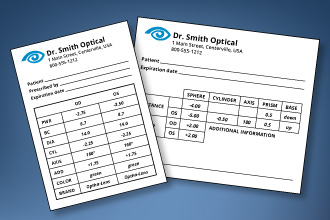Find Eye Doctor
Home Conditions Blurred Vision |
En Español
CONDITIONS
Blurry Vision In One Eye Or Both Eyes
By
Aimee Rodrigues; reviewed by
Gary Heiting, OD
Blurry vision is the loss of sharpness of
eyesight, making objects appear out of focus and hazy.
The primary causes of blurred vision are
refractive errors — nearsightedness, farsightedness and astigmatism — or
presbyopia. But blurry vision also can be a symptom of more serious problems, including a potentially sight-threatening eye disease or neurological disorder.
Blurred vision can affect both eyes, but some people experience blurry vision in one eye only.
Cloudy vision, where objects are obscured and appear "milky," is often mistaken for blurry vision. Cloudy vision usually is a symptom of specific conditions such as
cataracts, but blurry and cloudy vision can both be symptoms of a serious eye problem.
A qualified eye doctor can measure the extent of your blurred vision and determine the cause with a comprehensive
eye exam, including
spatial contrast sensitivity, slit-lamp and standard
Snellen eye chart tests.
Sudden blurry vision that persists could be a sign of a serious health problem, and you should see a doctor immediately. (Please click here to
find an eye doctor near you.)
Blurry Vision: Causes And Treatment
Myopia: Blurry vision in one eye or both eyes may be a symptom of
myopia(nearsightedness), along with squinting, eye strain and headaches. Myopia is the most common refractive error and causes objects in the distance to become blurred.
Eyeglasses , contact lenses and
refractive surgery
such as LASIK and PRK are the most common ways to correct nearsightedness.
Watch this video on what causes blurry vision and how we can correct it.
Hyperopia: Blurred vision from (farsightedness) is when distant objects can be seen sharply but your eyes can't focus properly on close-up objects or doing so causes unusual eye strain and fatigue. In cases of severe farsightedness, even distant objects may appear blurred.
Like myopia, hyperopia can be corrected with eyeglasses, contact lenses or refractive eye surgery.
Astigmatism: Blurred vision at all distances often is a symptom of
astigmatism. A type of refractive error, astigmatism usually is caused by an irregularly shaped
cornea.
With astigmatism, light rays fail to come to a single focus point on the
retina to produce clear vision, regardless of how far away the viewed object is from the eye. Astigmatism, like nearsightedness and farsightedness, can be corrected with eyeglasses, contact lenses or refractive surgery.
Presbyopia: If you're over 40 and beginning to experience blurry vision up close — when reading a newspaper or other small print, for example — chances are this is due to the onset of
presbyopia, a naturally occurring age-related condition.
While the symptoms of presbyopia are the same as those caused by hyperopia (blurry near vision; eye strain when reading), presbyopia is a diminished ability to focus on near objects due to hardening of the lens inside the eye rather than a defect of vision caused by the overall shape of the eye like hyperopia.
Common treatments for presbyopia include
progressive lenses, bifocals and reading glasses. There also are
presbyopia surgery options — including
corneal inlays,
monovision
LASIK and
conductive keratoplasty.
For all eyeglasses to correct refractive errors and presbyopia, clarity and comfort can be enhanced with
anti-reflective coating and
photochromic lenses. Ask your optician for details.
View attachment 60213
View attachment 60212
View attachment 60214
At top is a clear view of a Jack Russell terrier, while the blurry photo in the middle shows how the dog might appear to a very nearsighted person. At bottom, the view is both blurred and clouded, as it might appear to someone with cataracts.
Chronic dry eyes: Dry eye syndrome can affect your eyes in numerous ways, including
blurred and fluctuating vision. While
artificial tears (lubricating eye drops) can help, more advanced dry eyes may need a prescription medication or
punctal plugs to keep the eye lubricated and healthy.
Pregnancy: Blurry vision is common during pregnancy and sometimes is accompanied by
double vision (diplopia). Hormonal changes can alter the shape and thickness of your cornea, causing your vision to blur. Dry eyes also are common in pregnant women and can cause blurred vision.
You should always report any vision disturbances during pregnancy to your doctor. While blurry vision is not always serious, in some cases it could be an indicator of gestational diabetes or high blood pressure.
Ocular migraines or migraine headaches: While generally harmless and temporary, blurred vision, flickering light, halos or zigzag patterns are all common symptoms prior to the start of an
ocular migraine or migraine headache.
Eye floaters: Vision can be blurred by temporary spots or
floaters drifting in your field of vision. Floaters typically appear when the eye's gel-like
vitreous
begins to liquify with age, causing microscopic bits of tissue within the vitreous to float freely inside the eye, casting shadows on the retina.
While a normal part of the aging process, if you see a sudden shower of floaters it could signify a torn or
detached retinaand you should see your eye doctor immediately.
Blurry vision after LASIK: Your vision may be blurry or hazy immediately after LASIK or any other type of refractive surgery. Clarity should improve within a couple of days, but it may take several weeks for your vision to stabilize completely.
Eye drops and medication: Certain eye drops, especially medicated eye drops containing preservatives, can cause irritation and blurry vision. In most cases, these side effects can be controlled with artificial tears, prescription dry eye medication or punctal plugs.
Also, some
medications such as allergy pills can cause side effects of dry eyes and blurred vision. During a comprehensive eye exam, your optometrist or ophthalmologist can advise you whether any of your medications might cause blurry vision.
Over-wearing contact lenses: Wearing
disposable contact lenses (or indeed any type of contacts) for longer than your doctor prescribed will cause proteins and other debris in your tear film to build up on the lenses. This can cause blurry vision and increase your risk of eye infections.
Blurry Vision Can Be A Symptom Of A More Serious Eye Problem
Eye conditions and diseases: If you have sudden blurry vision in one eye and are over 60, you may have developed a
macular hole in the part of the retina where fine focusing occurs. Blurry vision also may be a symptom of a detached retina,
eye herpes or optic neuritis (inflammation of the optic nerve), among other causes.
Certain eye conditions and diseases can cause permanent loss of vision, so it's important to visit your eye care practitioner for diagnosis and prompt treatment.
Cataracts: Vision changes such as blurred vision or cloudy vision, as well as glares and night "halos," may be symptoms of a cataract. If unremoved, cataracts can eventually grow so cloudy that they obstruct vision to the point of blindness. But by replacing cataracts with artificial lenses,
cataract surgery is very successful in restoring lost vision. (
Read more about cataracts causing blindness.)
View attachment 60215View attachment 60214View attachment 60215View attachment 60213View attachment 60212
Try these interactive Rx forms to learn what the measurements mean on your eyeglass prescriptionor contact lens prescription.
Glaucoma: Blurry vision or "
tunnel vision" may be indicative of
glaucoma. Symptoms can include a gradual or sometimes sudden narrowing of your field of vision accompanied by blurred vision at the edges of your field of view. Without intervention, vision loss will continue, and permanent blindness may result.
Age-related macular degeneration: A gradual loss and blurring of vision, including distortions such as straight lines appearing wavy or broken, could be symptoms of
age-related macular degeneration (AMD), a leading cause of blindness among older people.
Diabetic retinopathy: If you have diabetes, unexplained blurred vision may be due to the onset of
diabetic retinopathy, a sight-threatening disease that damages the retina of the eye.
Cardiovascular disease and other systemic diseases: Blurred vision, often in conjunction with double vision, can be a symptom of an underlying health emergency such as a stroke or brain hemorrhage; or it can be an early sign of multiple sclerosis. If you have sudden blurry vision or double vision, see your doctor immediately.
If you have some minor blurring that comes and goes, this could mean simply tiredness, over-exposure to sunlight or eye strain.
However, sudden or continuing changes in vision such as blurriness, double vision, tunnel vision, blind spots, halos or dimness of vision could be signs of a serious eye disease or other health problem.
If you have sudden changes to your vision, you should always
contact your eye doctor immediately.
Page updated August 20, 2018
Find an eye doctor near you and schedule an exam.
Aimee Rodrigues
Aimee Rodrigues has many years of editorial experience in consumer publishing, with an emphasis on the health, pharmaceutical and beauty fields. Previously she was the executive editor …
read more
Hot Topics
CONDITIONS
Cataracts: 3 common types, causes, symptoms and treatments
 CONDITIONS
Glaucoma: Symptoms, treatment and prevention
CONDITIONS
Glaucoma: Symptoms, treatment and prevention
 DIGITAL EYE STRAIN
Computer eye strain: 10 steps for relief
DIGITAL EYE STRAIN
Computer eye strain: 10 steps for relief
 CONDITIONS
Red eyes (bloodshot eyes): How to treat red eyes
CONDITIONS
Red eyes (bloodshot eyes): How to treat red eyes
 CONDITIONS
Eye twitching: 8 causes and remedies
CONDITIONS
Eye twitching: 8 causes and remedies

FIND EYE DOCTOR




















